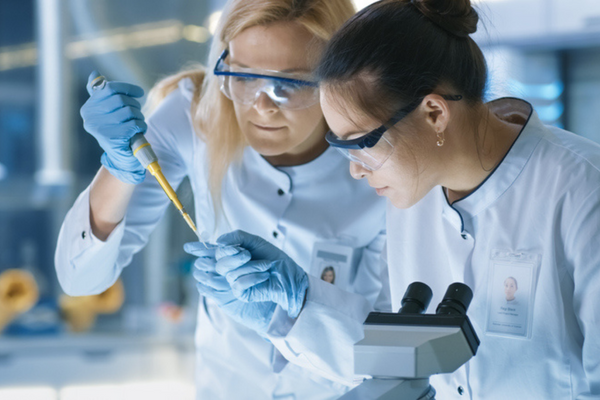
Key Takeaways:
- Challenges of working in the manufacturing industry
- The importance of trust in the workplace
- Jennifer Pfeiffer’s advice for working in a male-dominated industry
As a freshly minted chemical engineer, describe your first production engineer job, what attracted you to take it, and what you most liked about it?
While I was a chemical engineering student at Colorado State, I was offered an internship at Dow Chemical. During this internship was when I really knew that Dow was the kind of company that I wanted to work for. Therefore, I accepted a full-time position with Dow.
My first engineering position was in site logistics where I was responsible for the storage and loading assets. We were in the process of automating a lot of equipment and I was doing the projects to implement the process control changes and the programming of the new equipment.
As a new engineer, getting to do something that was so directly tied to my schooling was very exciting and made me feel like I was making an impact to support the facility. The department was very supportive, and I was able to learn quickly and have a high level of responsibility from the beginning.
Most people probably lack an appreciation for the challenges of keeping manufacturing plants operating 24/7/365. Can you describe a typical day, and the types of actions that are required? What sort of things happen on a particularly bad day?
Every day is different when you work in manufacturing! That is what makes it an exciting place to work. As an engineer, we are taught how to solve problems. When you are working in a manufacturing facility, every problem is a “team sport”. Complex manufacturing processes present different challenges around equipment, process conditions, product quality and safety.
Solving these problems require input from the engineers, the operators and often the process control and product quality teams. I love the “family” environment that develops while you work together, listening to each other’s ideas and resolving issues to keep the plant working as it should.
A particularly bad day is any day where there is an environmental or safety issue. This is why Dow works incredibly hard, in a proactive way to ensure we design, operate and maintain our facilities to prevent any safety incidents from occurring. Our goal is zero incidents, and we have many, many facilities delivering to that goal every year.
Operation of a complicated chemical enterprise requires many people. There are lots of places where one person making a wrong decision would lead to a troubling outcome. How important is trust within the organization? How do you build and maintain trust? How do you establish trust when you move to a new job?
At Dow, safety is priority No. 1. It is that simple. We want every employee and contractor to return home safely. We want to protect our communities and our environment and it is this safety culture that acts as the foundation of everything we do. It enables trust and empowers employees to do their job with a strong safety mindset. Chemical manufacturing requires a large organization where everyone has a different set of skills and experiences. Together, the team keeps the plant operational and enables development and growth of the individuals. When someone makes a mistake, we work to understand why they made the mistake. Did they have insufficient training, lack of technical support, incorrect procedures or was it poor judgment? By understanding why the error occurred, we can put the necessary corrective actions in place to prevent reoccurrence.
What are the biggest changes in chemical manufacturing you’ve lived through? What are the changes on the horizon that most excite you?
I think the biggest change/improvement I have seen is in the area of process safety. When I look at the significant improvements made by Dow, and industry in general, over the last few decades to significantly reduce loss of containment events and significantly increase the safety of our operations, I’m proud. It was not easy and required Dow and all of Dow’s employees to really live a “safety first” mindset. We have spent and continue to spend a significant amount of resource time and capital to continuously improve the safety of our processes. This makes me proud to work for Dow as a leader in process safety.
Looking to the future, I’m excited about applying that same focused mindset to sustainability. We have broadened our safety mindset to include the impact our operations have on the world beyond where our plants operate. We are focused on our carbon footprint, the circularity of our products, water use and other aspects of sustainability. I feel this is the engineering problem of this generation and, just as we have used good engineering practices to make major advances in process safety, we will use the same techniques to move our industry forward in alignment with our sustainability objectives.
Regarding your early career team members (i.e., 0-5 years’ experience), what is most important for them to accomplish in their first five years if they wish to be considered for advancement/promotion opportunities?
The first 5 years of an engineering career is really the time to hone your technical skills. This means taking on roles that allow you to really learn process design, process chemistry, process control, equipment design and production knowledge. In order to be successful in higher-level roles later in your career, you need to have this strong technical foundation to draw from.
It is also important early in your career to learn how to articulate technical information in a succinct way. Learning what information is important for communication and what details can be left out while still enabling understanding of the topic is critical. Those early career engineers that have high technical knowledge and can communicate effectively always stand out when considering promotion opportunities.
You are a successful woman in a male-dominated area of a male-dominated industry. Can you describe some of the challenges you’ve faced, and what allowed you to be successful? What advice would you give a young woman chemical engineer just starting out in a manufacturing job?
This profession has changed a lot over the last 25 years. When I started, I was often the only female engineer in the group and more than one time I was the “first female leader” in a plant or organization. This did present some examples where I believe I had a harder time being accepted, and in some cases, of having to assert my leadership over some reluctant male colleagues. This has changed as we have seen more and more women come into engineering and more women in technical leadership positions.
My advice to young female engineers is that “you chose a great career”. I think women are more and more highly appreciated for what they bring to this profession. Their ability to balance technical skills with team-building and collaboration makes them very successful and sought after as individual contributors and organizational leaders. I would also encourage them to not think of this field as male-dominated anymore as I think that will hold them back. The opportunities for women are tremendous and they need to just focus on developing themselves and taking on challenging assignments that allow them to grow and prepare themselves for big opportunities in their careers.
During the pandemic, plant operations required people on-site, while at the same time, many other employees had the flexibility to work remotely. What was learned from the pandemic response in terms of manufacturing?
I think we really learned how flexible and resilient our manufacturing employees can be in a time of crisis. They understood that it was essential to keep our plants running to provide the essential goods needed to protect ourselves from the pandemic and provide needed supplies to the people staying at home.
Our manufacturing facilities had to develop protocols and procedures “on the fly” to keep themselves safe. They worked tirelessly and through many unknowns to keep the plants online. I can’t tell you how proud I was of all of our sites globally. They not only defined how to run a plant through a pandemic, they did it while keeping everyone as safe as possible. I believe it is the preparation and training that we put our manufacturing teams through to be ready for any unplanned event that may occur that helped them find solutions so quickly during this dynamic time.
Natural disasters can knock operations sideways. Did Hurricane Ida, which hit the New Orleans area last year in August, complicate Dow operations in the Gulf of Mexico? What sort of things can Dow do to mitigate the impact of natural disasters?
We have many manufacturing sites and critical infrastructure on the gulf coast which means hurricane season is always a stressful time for us. Hurricane Ida made a direct hit on our Saint Charles Operations site resulting in damage to the site and to the community. Dow sites take many actions ahead of, during and following a storm to ensure the safety of our process and our people. Once we know our assets are secure and there is no risk to anyone, we quickly shift our focus to our people and helping them in their personal property recovery efforts.
The impact of Ida was significant and took multiple weeks to get the site back online. We also have people in the community who are still recovering from the storm damage. Every time a storm hits, we learn something more about how to prepare and respond, resulting in continuous improvement to our hurricane preparedness and recovery plans.
There have been many media reports of late about people who left the workplace in the last two years, looking to return. Dow’s ReAction Program seems to validate this trend. Can you briefly explain the program, and what Dow hopes to achieve through it?
I’m very proud of Dow’s ReAction program and was a co-leader to launch the program in Dow 2 years ago. We know there are many talented people that had to leave the workforce for various reasons including childcare, parental care, medical issues, or other reasons. We also know that reentering the workforce after an extended absence presents unique challenges and many people lack the confidence in their skills to just jump back in. The ReAction program serves to provide a support structure for people returning after an extended absence from their careers.
We provide direct mentorship to each ReAction employee to ensure they are successful and ensure we are meeting their unique development needs with a hope of accelerating them up the organization to fill critical roles in the mid-career level of Dow. I am personally mentoring one of our ReAction hires and she is doing a great job at one of our sites in Kentucky!
What are the non-technical skills you most rely on to succeed in your job? How did you acquire and develop them?
By far the most important non-technical skill I use is communication. One of the challenges many technical professionals have is understanding how to effectively communicate technical information to non-technical audiences. In my role, I’m often presenting technical information to other members of my business team who come from commercial, finance, human resources and other support functions. The key is to understand how to provide enough information and context to drive to the necessary outcome without overwhelming the audience with technical know-how and jargon. This is a skill that takes practice.
You can accelerate your development if you begin all communications by starting with an analysis of what the audience really needs to know to either make the needed decision or use the information for their own work. By starting with the audience’s needs in mind, versus your own body of work, you will shape a meaningful communication hitting just the right level of information for the team.
If you could go back in time, what’s the single best piece of work-related advice you would give your 30-year-old self?
I often give career talks to people inside my company and to outside audiences as well. One thing I always share is that I think there is an aspiration gap among women. We tend to limit ourselves by limiting how high we “dream to be” in our careers. I think it is because we see it as failure if we aspire to higher levels and then don’t achieve them. I certainly limited my thinking on what was possible in my career. Fortunately, I had mentors that opened my mind to doing big things and taking some risks.
I like to separate goals and aspirations. Goals are something that should be in your control, and you should have a good chance of achieving if you try hard. Aspirations should be something less in your control but set the goalposts you want to move towards. You may not fully achieve all you aspire to but I’m certain you will go further and experience more if you set those goalposts further and higher.
Something you love about Midland, Michigan, and something you would like to change about it?
Midland has so many wonderful outdoor spaces. The parks, trails, and gardens are really amazing and provide so many different ways to get outside and enjoy nature, exercise or just go walking with friends.
The one thing that Midland is really still missing is a great restaurant scene. There has been some progress in the last few years where we have a few unique and chef-owned restaurants popping up. I’m a big foodie so I love chef-inspired cuisine drawn from local ingredients and scratch cooking. We also need more restaurants with patios to enjoy a meal outside in the Summer!

Jennifer Pfeiffer is currently the Global Director of Operations for the Industrial Intermediates and Infrastructure envelope with Dow Incorporated (Dow). In this role, she is accountable for translating and implementing the business strategies within Operations across all Industrial Intermediates and Infrastructure manufacturing facilities and technology centers globally. This envelope within Dow represents 60+ manufacturing facilities and over 2000 employees globally.
Jennifer began her career in 1997 as a production engineer with Dow. From 1997 through 2007, she held many engineering and leadership positions with Dow in the Houston, TX area. In 2012, she relocated to Midland, MI, where Dow is headquartered, to take on a Business Excellence and Global Supply Chain Director role for the Polyurethanes business. In 2014, she relocated to Boehlen, Germany to serve as site director for Dow’s Olefins site in the region. In 2016, Jennifer relocated back to Midland, MI to take on the role of Technology Center Director and Business Manufacturing Director for Dow’s Performance Silicones business. She assumed her current envelope leader role in 2021.
Jennifer holds a Bachelor of Science degree in Chemical Engineering from Colorado State University. She is a recipient of the Manufacturing Institutes Women in Science, Technology, Engineering and Production (STEP) Award and serves as the chair for the Dean’s Advisory Board for the Walter Scott Jr. College of Engineering at Colorado State University. She is also a proud participant in Dow’s Women Innovation Network and serves on the leadership council for Dow’s Global African Affinity Network. Jennifer lives in Midland, MI with her husband of 23 years and her 2 teenage sons.
This article has been edited for length and clarity. The opinions expressed in this article are the author's own and do not necessarily reflect the view of their employer or the American Chemical Society.
Copyright 2022 American Chemical Society (All Rights Reserved)











